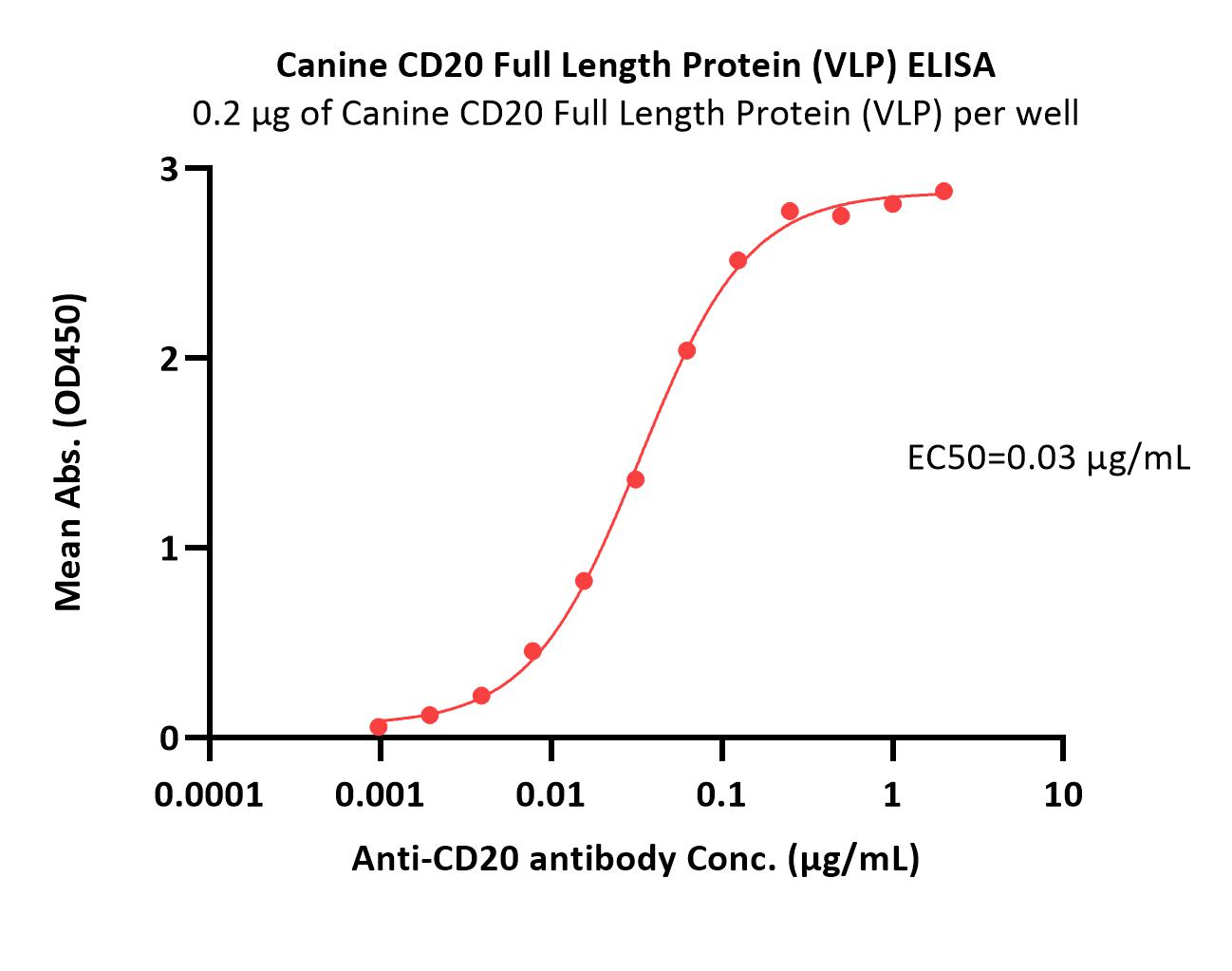分子别名(Synonym)
MS4A1,CD20,MS4A-1
表达区间及表达系统(Source)
Canine CD20 Full Length Protein (VLP) (CD0-C52P3) is expressed from human 293 cells (HEK293). It contains AA Met 1 - Pro 297 (Accession # Q3C2E2-1).
Predicted N-terminus: Met 1
蛋白结构(Molecular Characterization)
Virus-like particles(VLPs) are formed by self-assembly of envelop/capsid proteins from viruses. Membrane Proteins can be constituted in-situ with VLPs produced from HEK293 cell cultures. These VLPs concentrate conformationally intact membrane proteins directly on the cell surface and produce soluble, high-concentration proteins perfect for immunization and antibody screening.

The VLPs provide the display of properly folded membrane proteins in their native cellular membrane in a compact size of 100~300 nm diameter (similar to the size of most viruses) making it optimal targets for dendritic cells in vivo and surface attachment for phage display.
内毒素(Endotoxin)
Less than 1.0 EU per μg by the LAL method.
制剂(Formulation)
The VLPs are highly immunogenic, so the immunization strategy should be optimized (antigen dose, regimen and adjuvant).
Supplied as 0.2 μm filtered solution in PBS, Arginine, pH7.4 with trehalose as protectant.
Contact us for customized product form or formulation.
运输(Shipping)
This product is supplied and shipped with dry ice, please inquire the shipping cost.
存储(Storage)
Please avoid repeated freeze-thaw cycles.
This product is stable after storage at:
- The product MUST be stored at -70°C or lower upon receipt;
- -70°C for 12 months under sterile conditions.
活性(Bioactivity)-ELISA

Immobilized Canine CD20 Full Length Protein (VLP) (Cat. No. CD0-C52P3) at 2 μg/mL (100 μL/well) can bind Anti-CD20 antibody with a linear range of 0.01-0.625 μg/mL (QC tested).
Protocol
背景(Background)
B-lymphocyte antigen CD20 is also known as B-lymphocyte surface antigen B1, Leukocyte surface antigen Leu-16, Membrane-spanning 4-domains subfamily A member 1 and MS4A1, is an activated-glycosylated phosphoprotein expressed on the surface of all B-cells beginning at the pro-B phase (CD45R+, CD117+) and progressively increasing in concentration until maturity. CD20 is expressed on all stages of B cell development except the first and last; it is present from late pro-B cells through memory cells, but not on either early pro-B cells or plasma blasts and plasma cells. It is found on B-cell lymphomas, hairy cell leukemia, B-cell chronic lymphocytic leukemia, and melanoma cancer stem cells. The protein has no known natural ligand and its function is to enable optimal B-cell immune response, specifically against T-independent antigens. It is suspected that it acts as a calcium channel in the cell membrane. CD20 / MS4A1 is the target of the monoclonal antibodies (mAb) rituximab, Ibritumomab tiuxetan, and tositumomab, which are all active agents in the treatment of all B cell lymphomas and leukemias. Defects in CD20 / MS4A1 are the cause of immunodeficiency common variable type 5 (CVID5); also called antibody deficiency due to CD20 defect. CVID5 is a primary immunodeficiency characterized by antibody deficiency, hypogammaglobulinemia, recurrent bacterial infections and an inability to mount an antibody response to antigen.























































 膜杰作
膜杰作 Star Staining
Star Staining











